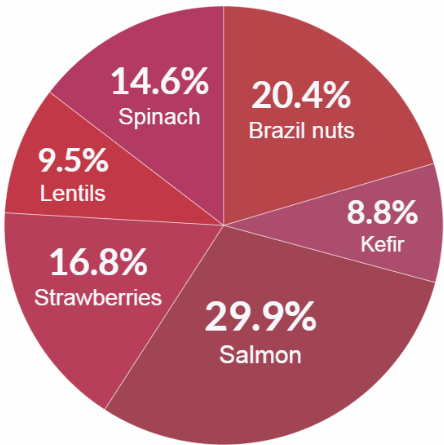Does food affect your mood?
When it comes to our mood, what we eat can definitely have an impact, and this makes sense when you consider how much our body relies on food.
What we eat can affect everything, from our blood glucose levels, to our muscles and joints, to how well we sleep at night. All of these can, in turn, play a role in determining how we feel – fluctuating blood glucose levels may cause mood swings, poor sleep may cause us to feel more irritable, etc.
In my blog, '5 surprising foods that can put you in a rubbish mood', I go into great detail about the types of foods you may want to avoid; but, today, I want to focus more on the types of foods that can actually boost your mood:
- Brazil nuts
- Kefir
- Salmon
- Strawberries
- Lentils
- Spinach
Below, I'll be taking a more in depth look at these foods, how they can bolster your mood and how you can incorporate them into your diet. Don't worry, though; if some of these foods don't appeal to you, I'll also be suggesting a few alternatives that you may wish to try instead!
1. Brazil nuts
Brazil nuts might not be the most popular nuts out there – the chances are, you'd probably rather munch on almonds, cashews or hazelnuts – but they do contain a surprisingly rich content of selenium, a little-known mineral that can have a big impact on your mood.
Selenium acts as a potent antioxidant, helping to eliminate the free-radical molecules which can damage your cells. This can have a positive effect on your entire body, including your cognitive functions and mood. The mineral, in collaboration with iodine, can also help to support your production of thyroid hormones.
A study from 2016 investigated the relationship between selenium and low mood on 7172 participants. The study found that selenium intake was negatively associated with higher risk of low mood.1 This would seem to confirm that selenium does play an important role when it comes to our mood, even if the exact mechanism is not well understood.
Since selenium is a trace mineral, we only need very small amounts to thrive – around 55mcg should suffice! Just one Brazil nut can contain up 91mcg of selenium so a little can go a long way.
How to include brazil nuts in the diet
Brazil nuts are great for snacking on or, alternatively, include them into a recipe. Check out our raw strawberry tartlets recipe.
What if I don't like Brazil nuts?
If you're not a fan of Brazil nuts, don't worry. There are plenty of other foods you can try that contain similar nutritional benefits, such as turkey, sunflower seeds, chicken or even eggs.
2. Kefir
Kefir is a fermented drink that's definitely rising in popularity. It's usually made using cow's milk or goat's milk and is considered to be a great source of protein, calcium and vitamin B12. While these nutrients can help to support your mood, what makes kefir so noteworthy is its content of probiotics.
Probiotics are friendly strains of bacteria that can help to create a more positive environment for your gut. Recent research has suggested that probiotics are associated with improving mood.2 This is backed up by a study that investigated the effects of probiotics on mood and sleep quality. For 6 weeks 38 participants consumed a daily dose of probiotics. The results showed a significant improvement in mood over the 6 weeks.3
What if I don't like kefir?
Kefir might not be for you, but one of the great things about fermented foods is the variety. You can pick from kombucha, kimchi or sauerkraut but, closer to home, even organic, plain yoghurt contains probiotic properties that could help to support your gut! Consider adding some plain yoghurt and berries into your diet as a mood boosting snack.
3. Salmon
Salmon is type of oily fish that is truly fantastic for our health. It contains plenty of selenium (that mood-boosting mineral I mentioned earlier!), plus it's rich in energy-boosting B vitamins, potassium and protein. All of these nutrients are wonderful for your mood but, what sets salmon apart, is its high content of omega-3 polyunsaturated fatty acids (PUFA's).
You have probably heard of omega-3 before as it's well-known when it comes to supporting our cognitive functions. When it comes to our mood, omega-3 PUFA's can help to lower inflammation, plus they can positively influence important neurotransmitters such as serotonin and dopamine. Research from 2015 found that omega-3 PUFA's have preventative benefits on mood and anxiety disorders due to their anti-inflammatory properties and their positive effects on neurotransmission.4
How to include salmon in the diet
Check out our potato cakes with smoked salmon and papaya chutney recipe.
What if I don't like salmon?
If you're vegan or vegetarian, salmon might not be an option for you. There are plant-based sources of omega-3 you could try, such as flaxseed oil, chia seed or walnuts; however, these usually only contain ALA, rather than the more active forms of omega-3, DHA and EPA. You could try a natural omega-3 supplement, though, such as Biocare's Phytomega-2, which is 100% vegan-friendly.
4. Strawberries
Who doesn't enjoy picking away at a bowl full of succulent strawberries in the middle of summer? These little red fruits are extremely popular and boast a wide variety of beneficial properties: they contain folate, are rich in fibre and are high in antioxidants to protect from free-radical damage.
Strawberries also contain vitamin C, an important nutrient that has been shown to help reduce stress and anxiety. One study found that vitamin C was capable of decreasing anxiety in high school students.5
How to include strawberries in the diet
If you want to try and incorporate more strawberries into your diet, you could try including them in smoothies, such as our Strawberry & Pear Smoothie.
What if I don't like strawberries?
If you don't like strawberries, then the good news is that there are plenty of other fruits to pick from: blueberries, blackberries, cherries, goji berries and acai berries are all extremely rich in vitamin C and other antioxidants to help support your mood.
5. Lentils
Lentils are a staple in many different types of diets across the world and for good reason. These legumes contain plenty of fibre, protein and iron to support your energy levels, whilst also being rich in magnesium and folic acid.
Magnesium, like selenium, is an important mineral for your mood, as it can help to convert tryptophan into serotonin and is needed to maintain healthy GABA levels – if you want to learn more, have a look at my blog "Which hormones make you feel tired?"
Lentils are regularly consumed in the Mediterranean diet. A study from 2015 investigated the effect of the Mediterranean diet on mood. During the study, 24 women switched to a Mediterranean style diet for ten days. At the end of the study, participants reported that their mood had improved.6 Therefore, following the Mediterranean diet may have a positive impact on your mood.
Remember, legumes are just one food group in the Mediterranean diet – if you want to learn more about this diet, I'd definitely recommend reading our Nutritionist Emma's blog, 'What makes the Mediterranean diet so healthy?'.
How to include lentils in your diet
You could also try incorporating more lentils into your diet by trying your hand at recipes such as our 15 Minute Rainbow Lentil Soup or our Coconut, Spinach and Red Lentil Dhal.
What if I don't like lentils?
If you don't like lentils then you could try a range of beans and pulses such as kidney beans, chickpeas, black beans and pinto beans.
6. Spinach
Spinach is a good leafy green to include in your diet if you're feeling a bit low. It's rich in vitamin C and magnesium, plus it's packed full of folate. Now, you've probably heard me mention folate several times in this blog already but, here, I'm going to explain a little bit more about why this nutrient is so important.
Folate, sometimes known as folic acid or vitamin B9, is needed to help produce and repair DNA, as well as red blood cells. It's a nutrient that we really need during pregnancy but studies have also found that those who suffer from low mood disorders like depression tend to display lower blood levels of folate.7 So, increasing your intake could possibly have a positive impact on your mood.
Spinach is estimated to contain as much as around 190mcg of folate per 100g, which is fantastic considering we only need 200mcg of folate a day, unless you are pregnant.
How to include spinach into your diet
You can increase your intake of spinach by adding it to a smoothie or by incorporating it into dahls and curries.
What if I don't like spinach?
If you don't like spinach, you could try loading up on other folate-rich vegetables like broccoli, Swiss chard, kale or avocados.
So, what can you take away from this blog?
Your food choices can affect your mood both positively and negatively. There are several foods that can have a positive effect on your mood so try and include some of these foods into your diet to help boost your mood. Remember, healthy eating for a healthy mind!
Originally written on 24th June 2019, updated on 11th December 2019.
What you said
We recently ran a poll to find out which of these 6 foods you consume most regularly. We've crunched the numbers and here are the results.
Results: Which of these 6 foods do you consume most regularly?
There are many health benefits of eating salmon including improving your mood and keeping your heart healthy, so it's great to see that 29.9% of you consume this regularly!

References
- https://www.ncbi.nlm.nih.gov/pmc/articles/PMC4884624/
- https://www.nutraingredients.com/Article/2019/11/01/Depression-and-diet-Expert-recommendations-for-changing-gut-bacteria
- https://www.frontiersin.org/articles/10.3389/fpsyt.2019.00164/full
- https://www.ncbi.nlm.nih.gov/pmc/articles/PMC4540034/
- https://www.ncbi.nlm.nih.gov/pubmed/26353411
- https://www.sciencedirect.com/science/article/abs/pii/S0899900714004468
- https://annals-general-psychiatry.biomedcentral.com/articles/10.1186/s12991-015-0059-x









